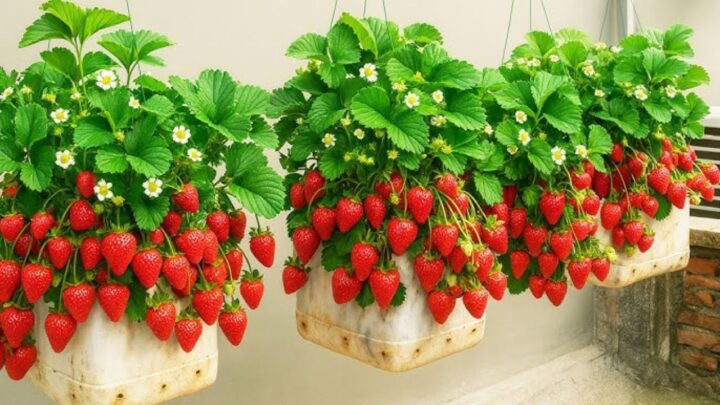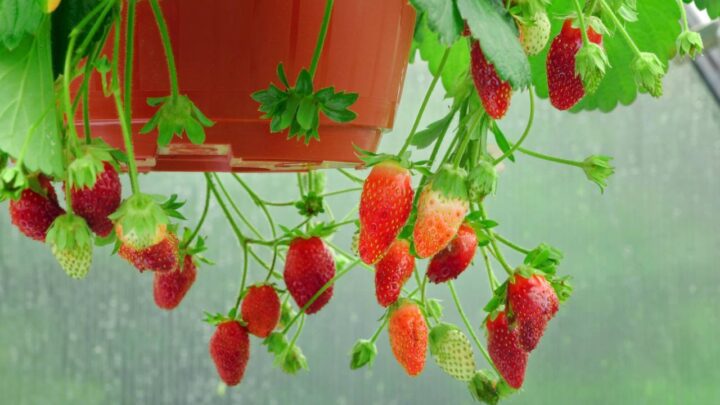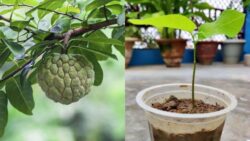Grow Strawberries in Hanging Containers : Grow Strawberries in Hanging Containers – An easy and space-saving way to enjoy juicy, homegrown strawberries right from your balcony or garden. Even if you have limited space, this method helps you harvest sweet berries all season long.
Why Growing Strawberries in Hanging Containers Works So Well
Growing strawberries in hanging containers is one of the most effective ways to maximize space while keeping your plants safe from pests and soil diseases. Hanging containers allow better air circulation, improved sunlight exposure, and make it easier to control watering. Plus, they add a decorative touch to your balcony or patio with lush green vines and bright red berries.
- Perfect for small balconies, patios, or windows.
- Prevents fruit rot by keeping berries off the ground.
- Easy to move for better sunlight or protection from rain.
- Reduces weed growth and soil-borne issues.
Best Strawberry Varieties for Hanging Baskets
When selecting strawberry plants for containers, choose everbearing or day-neutral varieties. These types produce berries throughout the season instead of just once a year. They are compact, hardy, and perfect for vertical gardening.
- Albion: High yield, sweet flavor, and disease resistance.
- Seascape: Produces large, juicy berries all season.
- Temptation: Compact and ideal for hanging baskets.
- Tristar: Excellent for continuous production.

Step-by-Step Guide to Grow Strawberries in Hanging Containers
- Step 1: Choose the Right Container
Pick a hanging basket or container at least 12 inches wide and deep. Make sure it has drainage holes at the bottom to prevent waterlogging. Plastic, metal, or coconut fiber baskets all work well for strawberries.
- Step 2: Use the Perfect Potting Mix
Strawberries need lightweight, nutrient-rich, and well-draining soil. Mix equal parts of potting soil, compost, and perlite or coco peat. Avoid using heavy garden soil as it can suffocate roots.
- Step 3: Plant Your Strawberries Properly
Place the plants so their crowns are level with the soil surface. Space them evenly around the basket’s edge for a cascading effect. Water gently after planting to settle the soil.
- Step 4: Position for Maximum Sunlight
Hang your container in a sunny location that receives at least 6–8 hours of direct sunlight daily. Rotate the basket occasionally so all sides get equal light exposure.
- Step 5: Water and Feed Regularly
Keep the soil moist but not soggy. During the fruiting season, feed your plants every two weeks with a balanced liquid fertilizer to boost berry production.
- Step 6: Prune and Protect Your Plants
Remove any dead leaves or runners to promote healthy growth. Protect your berries from birds by covering the basket with netting.
Extra Tips for Successful Strawberry Growing
- Use slow-release fertilizer for steady nutrition.
- Mulch with straw or dry leaves to retain moisture.
- Bring baskets indoors during frost or extreme cold.
- Pinch off early flowers to encourage stronger roots.
- Harvest berries early in the morning for best flavor.

FAQs
How often should I water strawberries in hanging containers?
Water them every 1–2 days during warm weather. Hanging baskets dry out faster than ground soil, so check the moisture daily.
Can I grow strawberries indoors?
Yes! Place your containers near a sunny window or under a grow light. Make sure they still get at least 6 hours of light every day.
When do strawberries start producing fruit?
Most plants begin producing within 6–8 weeks after planting, especially everbearing varieties that fruit continuously through summer.
How long do strawberry plants last?
With proper care, container-grown strawberries can thrive for 2–3 years before needing replacement or replanting.
Growing strawberries in hanging containers is not just rewarding but also fun and creative. Each ripe red berry you harvest will remind you how easy and joyful it is to grow your own food—even in the smallest of spaces. So grab a basket, plant some runners, and enjoy your homegrown sweetness all season long!




